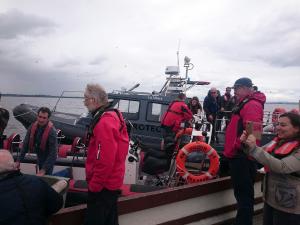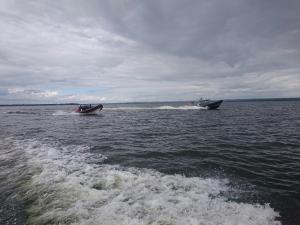The largest ever gathering of international eel experts seen in Northern Ireland was recently hosted at Toomebridge, by the Lough Neagh Fisherman’s Co-operative Society (LNFCS), Europe’s biggest wild eel fishery.

They were brought together by the International Council of the Exploration of the Seas (ICES), to discuss the issues surrounding the movement of stocked eels across the EU.
Chaired by Dr Derek Evans of Agri-Food and Biosciences Institute (AFBI), the group comprised 18 scientists from 9 European countries, and included a member of the European Commissions’ Directorate Generale (DG MARE) responsible for fisheries.

Pat Close, CEO LNFCS, opened the meeting with a welcome address, explaining that stocking occurs where glass eel seed are caught from donor estuaries and rivers with available supply and transported to recipient sites in the same river basin, another river basin, or a different country.
“The cost for glass eels can vary from £130 up to several hundred pounds per kilogram (£400 in 2016). With 3000 individual elvers to the kilogram, large-scale stocking is an expensive operation,” he said.

Since 1984, the natural recruitment of 100 million elvers into Lough Neagh has been supplemented with an additional 107 million elvers, at a cost of £4.8 million. This was part funded by £1.42 million in grant aid from the EU’s European Fisheries Fund (EFF), through the Dept of Agriculture Environment and Rural Affairs (DAERA).
Stocking can be used as a conservation measure to make best use of elver supply to support fisheries, mitigate against other man-made impacts, or, as is the case for the Neagh-Bann system, to help meet silver (breeding) eel escapement targets set under national Eel Management Plans.
Seamus Connor, Chief Fishery Officer Inland Fisheries, (DAERA) highlighted the importance of eel conservation measures in Northern Ireland. He said “the topic of stocking is a high priority for the EU and their scientific advisors (ICES). It is hoped that this working group, facilitated by Europe’s largest wild eel fishery at Toomebridge, will go some way to finding answers to questions over efficacy and best practice”.
Dr Evans commented that “current scientific reviews conclude that stocked eel can and do produce yellow eel in recipient fresh waters (after 10-15 years), and pre-spawning emigrating silver eel (after 12-18 years).
There is an ongoing debate as to whether stocking eels provides net benefit of an overall increase in silver eel numbers. This highlights the need for further research given the general lack of knowledge of the marine migration and spawning phase of any mature wild silver eel, let alone one derived from a stocked input”.
Notes to editors:
AFBI carries out high-quality technology research and development, statutory, analytical, and diagnostic testing functions for DARD and other Government departments, public bodies and commercial companies.
AFBI's Vision is “Scientific excellence in Northern Ireland…serving the world
All media enquiries to AFBI Press Office 028 9025 5326
Latest news
- AFBI issues Nematodirus warning – Spring 2025 11 April 2025
- Managing Nature Based Risks to the UK Economy and Opportunities for Green Finance 08 April 2025
- The Omics Days Conference 27 March 2025
- AFBI Hillsborough host AERA committee 27 March 2025
